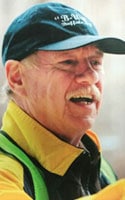Diagnosed with potentially terminal Stage 4 colon cancer, leader at Wellness Institute of Greater Buffalo faces challenge of his life with courage
By Michael J. Billoni

Phil Haberstro celebrated 30 years of leadership as founder and executive director of the culture-changing Wellness Institute of Greater Buffalo last fall.
He and his team committed to a strategic plan to guide them through the next decade of their Healthy Communities advocacy work and begin planning for Haberstro to retire and pass the baton to Lucy Connery, his associate director.
As the calendar moved into winter 2019, everything was smoothly proceeding with staff and volunteer input as preparations were made to launch its Healthy Communities 2030 initiative.
The annual release of the Robert Wood Johnson Foundation’s County Health Rankings, a key metric for measuring health and community quality of life, is usually a media event held in the WNED Studios in late March but it was cancelled due to the COVID-19 pandemic.
The week leading up to Memorial Day in May is when Haberstro’s life took a very unexpected and radical turn in the midst of the uncertainty of the pandemic. After treasuring and enjoying 50 years of exceptional health, Haberstro, 72, one of WNY’s most visionary, dedicated wellness warriors, was diagnosed with potentially terminal stage four colon cancer.
Q.: What were your first thoughts when you heard the prognosis?
A.: My first concern was for Bonnie, my wife of 37 years. She has been battling her own medical challenges for years, but this news has brought her considerable stress. For me, the surprise and shock of hearing that news has turned my life upside down —not so much mentally and spiritually — but physically.
For whatever reason, in one weekend, my entire life’s focus has changed.
Q.: What has helped you live with this news?
A.: A blessing is having a supportive family and, in my case, one with a medical background. Bonnie has a sports medicine degree; my brother James is a physical therapist and my niece, Katie, is a nurse, so I have what a lot of families do not have — family members who know and understand the complicated health care system and who can communicate with my medical team. They have truly been a blessing for me.
Q.: Who makes up your medical team?
A.: From the start, I knew I needed an oncology medical team and through Bonnie’s research, the Cleveland Clinic was ranked fourth in the nation, so we made an appointment to visit them. I had known them in the wellness field and a Buffalo native, Dr. Michael Roizen, is the chief wellness officer at the Cleveland Clinic.
Dr. Bassam Estfan, a medical oncology specialist at the Cleveland Clinic, is managing my care and working closely with my primary care physicians in Buffalo — Dr. Andrew Baumgartner of the University of Buffalo/MD Group and Dr. David Dogherty of the Buffalo Medical Group.
They have been awesome. They are also straight shooters, which is what I like because I am a listener.
Q.: Now that you are dealing with a terminal cancer prognosis, how are you dealing with it four months later?
A.: With family, friends and prayers, I have been blessed with a wonderful network of support that gives me great confidence as I take on this challenge. I have not been depressed and I have not cried and asked God, “Why is this happening to me?” When you get to the point of talking about terminal cancer, the reality of life sets in. My goal has always been to live to 100 and right now I am 28 years short. I have always been a goal setter and I am still looking forward to seeing what the world will look like when I hit that century mark in birthdays.
Q.: What is the medical game plan you are following today?
A.: Along with the medical procedures to battle the cancer, they want me to eat and not worry about calories, so I have been enjoying a lot of ice cream and milk shakes and things like that. I can walk as much as I can, and I am able to exercise on the gym equipment in my basement.
But mostly, they want me to stay active mentally so I will go to the wellness institute’s office in City Hall and be supportive of Lucy and her team on growing what we began 30 years ago.
What I believe is helping me through this is that I have had 50 years of perfect health, which I credit to living my life by the book — good nutrition, exercise regularly, no drugs, no alcohol and stress management.
I had been practicing my own form of mindfulness long before it became popular. If you look at risk factors for colon cancer, the only one I had was being a male.
Q.: What lessons have you learned from this that you can share with others battling cancer?
A.: The main thing is you must have a strong support network. You cannot take this on alone. Be open and do not be afraid to share your feelings with those closest to you. As word of this has drifted out, I cannot tell you how much the cards and words of encouragement have meant to me. I have so many people praying for me. I feel extremely blessed.
Q.: How important is the spiritual aspect in this battle?
A.: I attended St. John the Baptist Catholic grammar school and was in the first graduating class at Cardinal O’Hara High School in 1965. That religious upbringing provided me with a solid foundation and a strong sense of values.
Even if you are a non-believer, you cannot leave the prayer out of the equation. We have all seen and heard about miracles and I am a true believer in the power of prayer.
Q.: What do you see as unfinished business in your role with the Wellness Institute of Greater Buffalo?
A.: That’s easy. We still are not as healthy as we should be in this community and that is why government, foundations, businesses and local funders should all get behind the Healthy Communities 2030 initiative Lucy is now spearheading.
There is something in there for everyone to follow. I am also concerned about the health of our children and that is why I am honored to work with Erie County Clerk Mickey Kearns and many others in spearheading the Healthy District Initiative with several local school districts.
That initiative must continue to grow because it has now expanded into dealing with physical and mental health for our children.
Q.: What would you like to see when you celebrate your 100th birthday?
A.: For one, several more designations for Buffalo and this region as All American Cities. The big one, though, is that all the necessary stakeholders continue to work together toward the goal of creating healthy communities in Western New York, especially for our children and seniors. It is most important the funders and government leaders not be afraid in pursuing positive community change and to be aggressive, persistent, and passionate about it because these elements are essential to achieving sustainable results.
Q.: Reflecting on life experiences and lessons learned, any thoughts?
A.: A vision is good; a shared vision is better! When you are young, keep learning — it will lead you to wisdom sooner. When you are older, keep learning — it will keep you young! Stay tuned; my final chapter has yet to be written!

